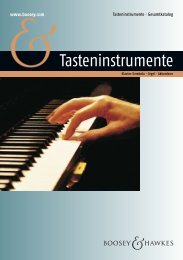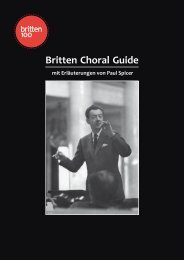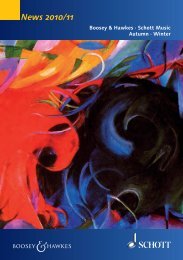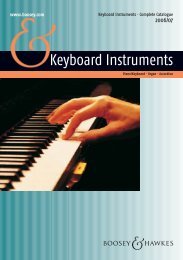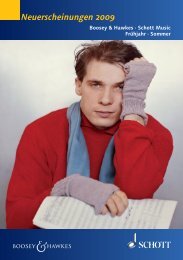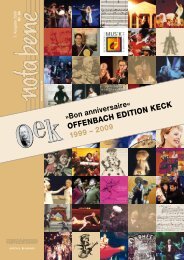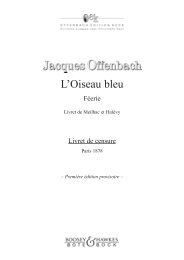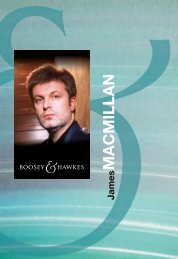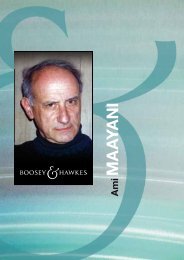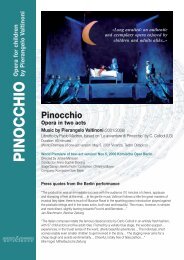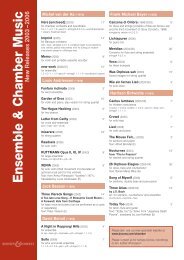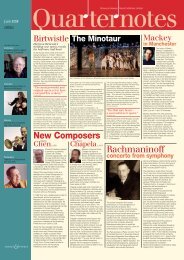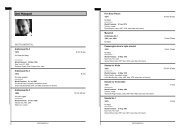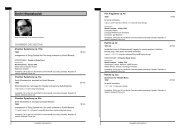Rattle opens Berlin season with Lindberg
Rattle opens Berlin season with Lindberg
Rattle opens Berlin season with Lindberg
Create successful ePaper yourself
Turn your PDF publications into a flip-book with our unique Google optimized e-Paper software.
October 2007<br />
2007/3<br />
Included in this issue:<br />
Chin<br />
Munich premieres Alice<br />
in Wonderland opera<br />
Kats-Chernin<br />
Interview reveals her<br />
influences and interests<br />
Turnage<br />
Orchestral tribute to the<br />
city of Chicago<br />
Andriessen<br />
Sailing to the City of Dis<br />
in Los Angeles<br />
Photo: Neil Bennett<br />
Boosey & Hawkes Music Publishers Limited<br />
<strong>Rattle</strong> <strong>opens</strong> <strong>Berlin</strong><br />
<strong>season</strong> <strong>with</strong> <strong>Lindberg</strong><br />
Magnus <strong>Lindberg</strong>’s new<br />
orchestral work, Seht die<br />
Sonne, provided a dramatic<br />
opening to the <strong>Berlin</strong>er<br />
Philharmoniker’s <strong>season</strong>.<br />
Following the August premiere of Seht die<br />
Sonne, commissioned by the Stiftung<br />
<strong>Berlin</strong>er Philharmoniker in association <strong>with</strong><br />
the San Francisco Symphony, Simon <strong>Rattle</strong><br />
tours the work <strong>with</strong> the orchestra to<br />
Carnegie Hall in New York on 13 November.<br />
Jukka-Pekka Saraste will conduct the<br />
Toronto Symphony Orchestra in the<br />
Canadian premiere in February 2008. The<br />
San Francisco Symphony under Sakari<br />
Oramo gives the first West Coast<br />
performance on 19 June 2008.<br />
Programmed at its premiere <strong>with</strong> Mahler’s<br />
Symphony No.9, <strong>Lindberg</strong>’s work is scored<br />
for the same forces as that of the Viennese<br />
MacMillan<br />
Sacrifice<br />
on tour<br />
James MacMillan’s new opera, The<br />
Sacrifice, premiered by Welsh National<br />
Opera in Cardiff on 22 September, tours to<br />
seven UK cities over the coming months:<br />
Liverpool (16 October), Southampton<br />
(24 October), Llandudno (31 October),<br />
Bristol (7 November), Oxford (14 November),<br />
Birmingham (21 November) and Sadler’s<br />
Wells in London (26 November). A full<br />
round-up of reviews of the opera will appear<br />
in the February 2008 issue.<br />
“…a new opera <strong>with</strong><br />
instant appeal.”Daily Telegraph<br />
The Sacrifice’s libretto by award-winning<br />
poet and novelist Michael Symmons<br />
Roberts is the latest in a series of<br />
collaborations <strong>with</strong> MacMillan. Drawing on<br />
The Mabinogion, the ancient collection of<br />
Welsh folktales, the opera tells of a ruler’s<br />
ultimate sacrifice to safeguard the future of<br />
his war-torn, faction-ridden country. The<br />
performances are conducted by MacMillan<br />
and directed by Katie Mitchell.<br />
Michael Symmons Roberts (librettist),<br />
James MacMillan, Katie Mitchell (director)<br />
and John Fisher (General Director, WNO) at<br />
workshops for The Sacrifice.<br />
MacMillan has extracted three interludes<br />
from the opera to form a 20-minute<br />
symphonic suite which he will conduct at<br />
Bridgewater Hall in Manchester on 22<br />
February <strong>with</strong> the BBC Philharmonic.<br />
Further MacMillan premieres in 2008 include<br />
the full-evening St John Passion performed<br />
by the London Symphony Orchestra and<br />
Chorus under Colin Davis (27 April), and<br />
a new work for the Takács Quartet to be<br />
premiered at the South Bank Centre (21 May).<br />
Photo: Hanya Chlala/Arena PAL<br />
master. Adopting its title from the final<br />
sunrise chorus of Schoenberg’s epic cantata<br />
Gurrelieder, the work explores the tipping<br />
point from late-Romanticism to modernism.<br />
“Sharp as a knife –<br />
a tour de force”Der Tagesspiegel<br />
“…a work that liberally mixes the exquisite colours<br />
of the orchestra… and that in its luminescent<br />
excess is indeed reminiscent of Schoenberg’s<br />
Gurrelieder: as a revolving sphere of sound in<br />
which opulence follows upon opulence.<br />
Frankfurter Allgemeine Zeitung<br />
Panufnik<br />
CD sampler<br />
Andrzej PANUFNIK<br />
explorations<br />
SELECTED WORKS<br />
CD Sampler<br />
Boosey & Hawkes has released a new<br />
promotional CD sampler of the music of<br />
Andrzej Panufnik (1914-91), exploring the<br />
works of this important Polish composer.<br />
There is plenty to discover beyond<br />
Panufnik’s popular Sinfonia Sacra in an<br />
output that chronicles his experience in wartorn<br />
Poland, survival as a composer under<br />
Socialist Realism, and life as an exile after<br />
his dramatic escape to the West in 1954.<br />
Beyond the autobiographical influences, his<br />
compositions set out to reconcile emotion<br />
and intellect, reaching back to a nearmedieval<br />
fascination <strong>with</strong> metaphysics and<br />
geometry. The music on the disc ranges<br />
from Apollonian serenity to the propulsive<br />
rhythmic writing that has proved so<br />
attractive to the dance community.<br />
The new sampler is available to performers,<br />
promoters and choreographers: please<br />
contact composers.uk@boosey.com.<br />
“Again and again the huge orchestra releases<br />
bolts of energy… <strong>Lindberg</strong>’s sun does not smile<br />
mildly upon its worshippers. Instead, it fires up the<br />
music and lends it a lasting resplendence.”<br />
<strong>Berlin</strong>er Morgenpost<br />
“…an extravagant and glittering piece on a grand<br />
scale, full of bold gestures and big effects… The<br />
second movement ends <strong>with</strong> a solo cello cadenza<br />
so lengthy that it is almost a miniature concerto, a<br />
mournful lament full of ethereal harmonics. The<br />
third movement is the work’s darkest, opening in<br />
the lower depths of the bass registers and rising<br />
to a howl of anguish before settling into a pensive<br />
chorale and slipping unobtrusively into silence.”<br />
Financial Times<br />
Clarinet and violin concerti travel<br />
Other summer highlights for <strong>Lindberg</strong><br />
included a rapturously received BBC Proms<br />
performance of the Clarinet Concerto <strong>with</strong><br />
Kari Kriikku as soloist. The Times described<br />
the work as “a perfect concerto, perfectly<br />
performed….” and the Daily Telegraph<br />
praised its “fabulous glittering orchestral<br />
palette, and glowing harmonies… It was<br />
heartening to see a packed Albert Hall<br />
audience rising to its feet and cheering a<br />
contemporary piece.”<br />
“If there’s any justice<br />
it will soon be as<br />
oft-performed as<br />
Mozart’s concerto”<br />
The Times on <strong>Lindberg</strong>’s Clarinet Concerto<br />
In recent months the Violin Concerto,<br />
premiered last year, has been heard for the<br />
first time in Copenhagen, London and<br />
Helsinki <strong>with</strong> soloist Lisa Batiashvili, whose<br />
new recording has just been released on<br />
Sony Classical (88697 129362). The<br />
concerto’s Swiss, German, Spanish and<br />
Norwegian premieres are scheduled during<br />
the 2007/08 <strong>season</strong>.<br />
"… a wonderfully effective concerto, entirely<br />
typical of <strong>Lindberg</strong>'s recent music yet thrillingly<br />
direct in its impact. Batiashvili's playing was<br />
exceptional, too; other violinists will surely rush to<br />
take up the work, but she has set a standard that<br />
will be hard to match." The Guardian<br />
Carter<br />
towards 2008<br />
Elliott Carter celebrates his 100th birthday on<br />
11 December 2008 and plans are in place<br />
for international celebrations, featuring the<br />
most recently completed scores by this elder<br />
statesman among<br />
American<br />
composers. Major<br />
birthday events are<br />
so far confirmed in<br />
Boston, New York,<br />
London, Paris,<br />
<strong>Berlin</strong>, Cologne,<br />
Amsterdam, Turin,<br />
Basel, Vienna,<br />
Lisbon, Porto and<br />
Gothenburg.<br />
James Levine conducts the premiere of<br />
Carter’s Horn Concerto on 15-17 November<br />
<strong>with</strong> the Boston Symphony Orchestra and its<br />
principal horn James Sommerville. The same<br />
forces tour the concerto to Carnegie Hall in<br />
2008 and Somerville gives the European<br />
premiere at a ZaterdagMatinée concert at<br />
the Concertgebouw in Amsterdam on<br />
19 January 2008 <strong>with</strong> the Radio Kamer<br />
Filharmonie conducted by Peter Eötvös.<br />
Daniel Barenboim will premiere Carter’s new<br />
15-minute work for piano and orchestra,<br />
Interventions, in December 2008 <strong>with</strong> James<br />
Levine conducting the Boston Symphony<br />
Orchestra. The work is co-commissioned by<br />
the Boston Symphony Orchestra, Carnegie<br />
Hall and the Deutsche Staatsoper <strong>Berlin</strong>.<br />
With his fecundity continuing unabated,<br />
Carter has also recently completed<br />
3 Mad-regales for six solo voices, Sound<br />
Fields for strings, and new instrumental<br />
miniatures for piano, oboe, viola and double<br />
bass.<br />
For news of Carter events in the centenary<br />
year please visit www.boosey.com/carter<br />
Your performances can be added to our<br />
web calendar by emailing us at<br />
composers.uk@boosey.com<br />
For programme notes on Carter’s complete<br />
output visit www.carter100.com<br />
www.boosey.com<br />
new-look website launched<br />
Photo: Meredith Heuer<br />
Our new-look website is now live, featuring both English and German, an updated design and<br />
improved navigation, including quicker links to deeper level material.<br />
Our shop area, offering sheet music from all publishers, CDs, DVDs, ringtones and<br />
downloads will be relaunched later this autumn.
Photo: Noosa Weekender Magazine<br />
Elena Kats-Chernin<br />
discusses her musical influences and interests<br />
Her new basset clarinet concerto, Ornamental Air, is performed<br />
in the USA, Europe and Australia by Michael Collins in 2008.<br />
You grew up in Uzbekistan,<br />
studied in Moscow and<br />
Germany, and settled in<br />
Australia. How do these<br />
cosmopolitan ingredients come<br />
together in your music?<br />
If forced to generalise about<br />
the influences on my music I’d<br />
say that my Russian<br />
background provided the<br />
strong rhythmic features, the<br />
strange mixture of<br />
lightheartedness and heavy<br />
melancholy, the bright<br />
orchestra colours, a sense of<br />
contrast and a tendency<br />
towards high energy. The early<br />
years of my initial stay in<br />
Australia (1975-80), fresh out<br />
of Moscow, added the<br />
excitement of new<br />
experimental sounds and<br />
much freedom in the<br />
structuring of the pieces. Then the years of study and<br />
work in Germany focused me upon the serious nature<br />
of the psychology of music, specifically in the theatre.<br />
Upon my return to Sydney in 1994 a lot of the above<br />
merged into a language.<br />
You’re equally at home composing for dance and<br />
theatre as for the concert hall. Has this versatility<br />
come about through chance or design?<br />
Each genre provides its own opportunities for<br />
learning. I have never planned the way my career<br />
would work - it has happened mostly by chance and<br />
step by step. I’ve always enjoyed the rehearsal<br />
process in the theatre where there are often long<br />
phases of making changes to sounds, when the<br />
relationship between music and theatre is in constant<br />
flux. That experience has in turn helped me when<br />
composing music for the concert hall - I can make<br />
quick decisions <strong>with</strong> regards to form or<br />
instrumentation. One of the things I have learnt is to<br />
be un-precious about my music. I can happily throw<br />
away huge chunks of material if it does not seem<br />
exciting enough for me.<br />
Your music ranges widely in style from piano rags to<br />
the complex textures of Clocks. Are you more<br />
interested in reflecting the world around you than<br />
creating a private style?<br />
I am too interested in people not to pursue that<br />
human connection. I constantly need to invent a way<br />
to make that connection translate into a piece of<br />
music. For me that is the ultimate aim in composing.<br />
It is not about describing the world, it is about<br />
describing what I think the world is in relation to<br />
something other: a person, an event, a thought, an<br />
idea or sometimes just a sentence. That relationship<br />
Brett Dean’s<br />
Vexations and<br />
Devotions received<br />
its European<br />
premiere at the BBC<br />
Proms on 23 July,<br />
providing a<br />
refreshing critique of<br />
the ‘vexatious<br />
banalities’ of modern<br />
life. David Robertson<br />
conducted the BBC<br />
Symphony<br />
Orchestra and<br />
Chorus together <strong>with</strong><br />
the young Australian<br />
choir Gondwana Voices. First performed at the 2006<br />
Perth Festival under Matthias Bamert, the work’s<br />
German premiere takes place in Stuttgart on<br />
13 March conducted by Andrey Boreyko.<br />
“… a work that skilfully<br />
reveals music’s ability to<br />
mock and to mourn<br />
simultaneously.”The Times<br />
“Brett Dean is rapidly becoming Australia’s best-known<br />
composer…His new piece Vexations and Devotions deals<br />
<strong>with</strong> things which on the surface are crushingly banal; the<br />
creeping deadness of soul that comes from too much telly,<br />
Photo: Bridget Elliot<br />
can be complex or simple and<br />
it will influence the way the<br />
piece will turn out. This, of<br />
course, meshes <strong>with</strong> the initial<br />
commissioning parameters like<br />
instrumentation, proposed<br />
duration, etc, which also play a<br />
role in the unfolding of the<br />
composition.<br />
What draws choreographers to<br />
your music?<br />
Maybe it’s the fact that my<br />
music has clear rhythmic<br />
qualities and is not too<br />
descriptive or overly developed<br />
– it leaves breathing space for<br />
the dance element. I in turn<br />
really get a buzz out of working<br />
<strong>with</strong> choreographers and a<br />
perfect example of this was<br />
collaborating <strong>with</strong> Meryl<br />
Tankard on the ballet Wild<br />
Swans, based on the fairy story of Hans Christian<br />
Andersen, made for Australian Ballet. I improvised on<br />
the piano to the dancers’ movements and most of<br />
the music for the ballet was created directly in the<br />
rehearsal space. The final length of the score for<br />
orchestra and soprano was about 90 minutes.<br />
How do you react when your music is used in new<br />
contexts, for instance Eliza Aria in the recent Lloyds<br />
TSB advertising campaign?<br />
I had a wholly positive reaction to hearing my music in<br />
these adverts: it’s a great pleasure for a composer’s<br />
music to be given a second chance! The animation<br />
artwork in the adverts is masterly and clever, and the<br />
way it fits <strong>with</strong> the music is incredibly thoughtful. The<br />
stories are all very cute and charming and one just<br />
has to love them. And it has made my music known<br />
to a whole new audience. Viewers’ reactions after<br />
viewing the YouTube video took me by utter surprise<br />
- it was just amazing to see that so many people<br />
were making really generous comments. And now<br />
that even pop and disco versions of Eliza Aria have<br />
been released, I’m experiencing another completely<br />
new sensation. I feel like I’m entering a world that was<br />
closed to me previously.<br />
What are your future ambitions or dreams?<br />
My current ambition is to write a full-length opera, not<br />
a chamber opera (of which I have written three<br />
already), <strong>with</strong> soloists, choir and orchestra. Other<br />
dream projects would be a big choral symphony,<br />
perhaps in a 12 movement form – this number has a<br />
special significance for me – or something for kids<br />
along the lines of Young Person’s Guide to the<br />
Orchestra. I also enjoy working <strong>with</strong> visual artists and<br />
film makers, so am hoping for some lively<br />
collaborations in the coming years.<br />
Dean vexations & devotions<br />
the maddening automated telephone voices that keep you<br />
on hold, and the vacuity of corporate mission statements.”<br />
Daily Telegraph<br />
“Thank you for holding,” said the irritating mechanised voice<br />
in Brett Dean’s Vexations and Devotions, adding that our<br />
holding was important to them, and finally embarking on a<br />
hilarious philosophical disquisition on different types of<br />
holding. The texts of Dean’s ‘sociological cantata’ by<br />
Australian poet Dorothy Porter and cartoonist Michael<br />
Leunig articulate some of the intolerable vexations of modern<br />
life <strong>with</strong> bracing wit. Evening Standard<br />
“The second ‘movement’, Bell and AntiBell, starts <strong>with</strong> violas<br />
buzzing like angry wasps around an almost unbearable<br />
crescendo of real and synthesized bell sounds. And then the<br />
voiceover, which apologises for being busy, and thanks us<br />
for holding. Holding what? The voice takes on a wild life of<br />
its own, in psychological speculation, while violin tremolandi,<br />
shaken aluminium foil and ticking pizzicato reverberate like<br />
wounded nerve endings…” The Times<br />
Dean continues working towards his new opera<br />
Bliss, based on the novel by Peter Carey, to be<br />
premiered by Australian Opera. His 25-minute<br />
orchestral study for the opera, Moments of Bliss,<br />
has been performed in Melbourne, Cologne and<br />
Manchester. Dean is currently completing Songs of<br />
Joy, a Liverpool Capital of Culture commission to be<br />
premiered by Simon <strong>Rattle</strong> and the Royal Liverpool<br />
Philharmonic Orchestra in October next year. These<br />
songs for baritone and orchestra set texts by the<br />
opera’s librettist Amanda Holden intended for Harry<br />
Joy, the adman in Carey’s novel who is offered a<br />
nightmarish view of his life and family after suffering<br />
a heart attack.<br />
Chin Alice in Munich<br />
The first night of Unsuk Chin’s new opera, Alice in<br />
Wonderland, provided the opening of the Munich<br />
Opera Festival on 30 June <strong>with</strong> a fair measure of<br />
controversy. Some of the gala audience, stockful of<br />
dignitaries and official guests, seemed increasingly<br />
perturbed - perhaps objecting to some of the<br />
alienation techniques in Achim Freyer’s colourful and<br />
characteristic production - and reacted vociferously at<br />
the curtain call. But as the Los Angeles Times noted<br />
in a review headed ”Alice in Wonderland triumphs in<br />
Munich”, the second night of the run ”proved a hit...<br />
When the performance was over, thunderous<br />
applause and foot-stomping on the resonant wood<br />
floors greeted cast, conductor and composer... ”<br />
“A wondrous new work<br />
has, like Alice from her<br />
rabbit hole, emerged.”<br />
Los Angeles Times<br />
Kent Nagano, a long-time supporter of Chin’s music,<br />
expertly conducted the Bavarian State Opera forces,<br />
<strong>with</strong> a strong cast including Sally Matthews in the title<br />
role, Piia Komsii, Dietrich Henschel, Guy de Mey and<br />
Andrew Watts. The veteran soprano Gwyneth Jones<br />
revelled in the role of Queen of Hearts and, as The<br />
New Yorker’s Alex Ross noted, her rendition of ”Off<br />
<strong>with</strong> their Heads!” made you ”stroke your own neck a<br />
bit nervously”. The opera returns in the main Munich<br />
autumn <strong>season</strong> for further peformances on 15, 17, 20<br />
and 23 November.<br />
“Alice has found the way from wonderland to grand opera,<br />
<strong>with</strong> a luxuriant orchestra as welcoming committee: guided<br />
and presented by Unsuk Chin... Expectations ran high, the<br />
preparations were considerable – and the result is as<br />
colourful as a look through a kaleidoscope...”<br />
Hannoversche Allgemeine<br />
BARTÓK<br />
Connections<br />
A guide for performers and programmers<br />
by<br />
Malcolm Gillies<br />
Boosey & Hawkes has collaborated <strong>with</strong> Bartók<br />
expert Malcolm Gillies to produce Bartók<br />
Connections, a new guide exploring repertoire<br />
themes for this towering figure of 20th century music.<br />
A printed version <strong>with</strong> CD sampler is available upon<br />
request for performers and programmers by emailing<br />
composers.uk@boosey.com, and a web version of<br />
the guide <strong>with</strong> soundclips is available to all at<br />
www.boosey.com/bartokconnections.<br />
Bartók Connections contains repertoire notes for the<br />
composer’s complete output of works published by<br />
Boosey & Hawkes, Universal Edition and Editio<br />
Musica Budapest. The recorded extracts draw<br />
extensively on the Hungaraton complete edition, and<br />
the printed guide is illustrated <strong>with</strong> a rich variety of<br />
images provided by the Bartók Archive Budapest and<br />
the composer’s son Peter Bartók. A timeline links<br />
Bartók’s creative life <strong>with</strong> contemporary events, both<br />
cultural and in the world at large.<br />
Themes explored by<br />
Malcolm Gillies in the<br />
guide include Bartók’s<br />
roots in late-<br />
Romanticism and folk<br />
music, his engagement<br />
<strong>with</strong> nationalism along<br />
<strong>with</strong> Kodály and<br />
Dohnányi, relationships<br />
<strong>with</strong> contemporaries<br />
including Stravinsky,<br />
Debussy and<br />
Szymanowski, the<br />
appearance of Arabic<br />
influences in his music<br />
(the CD includes a recording from a field trip to North<br />
Africa), and late works written in American exile<br />
including his personal take on jazz in Contrasts.<br />
Image: Bartók Archive Budapest<br />
WITH AUDIO CD<br />
Photo: Wilfried Hosl<br />
Photo: Boosey & Hawkes<br />
“Chin’s sound world is seductively cavernous, suggesting<br />
not only the magical rabbit hole down which Alice tumbles<br />
but also the psychological crevasses beneath the surface of<br />
Carroll’s writing... Within a few minutes, the entire orchestra<br />
is glittering weirdly: familiar shapes hover at odd angles; ageold<br />
harmonies materialize from clouds of timbre and texture;<br />
childlike snatches of song appear and disappear, like the<br />
body of the Cheshire Cat... The wondrous thing is how<br />
effortlessly Chin changes pace, from delicacy to<br />
grotesquerie, from cutesiness to dementia. Everything flows<br />
organically.” The New Yorker<br />
Unsuk Chin’s Alice in Wonderland at the Bavarian<br />
State Opera in the production by Achim Freyer<br />
”Unsuk Chin has internalised Carroll’s diction completely.<br />
She describes Alice’s inhospitable dream world <strong>with</strong><br />
wonderful humour and cheekiness, but also <strong>with</strong> tender<br />
empathy and generous amounts of mockery… the tea party<br />
<strong>with</strong> Baroque sounds, the sweetly broken lullaby in C-major<br />
for the Piglet… The bass clarinet for the Caterpillar, which<br />
both cheekily and wistfully paraphrases Gershwin, is as<br />
delightful as the mouth organ for the Mock Turtle... First and<br />
foremost, the music is fast, rhythmically lively and therefore<br />
very close to the text <strong>with</strong> its rapid emergence and<br />
disappearance of situations.” Tageszeitung (Munich)<br />
“Accompanied by plummeting semiquaver runs of the<br />
violins, Alice tumbles into the rabbit hole; later, she dives into<br />
the pool of her own tears that shimmers impressionistically<br />
like phosphorescent plankton. Bell tones, sound clusters and<br />
the thread of the bass tuba provide the background for the<br />
lament of the Mad Hatter… And the steaming, flashing<br />
orchestral thunder storm during the croquet match is a wellnigh<br />
illustrative masterpiece.” Frankfurter Allgemeine Zeitung<br />
“Unsuk Chin’s score, a testimony to commanding musical<br />
craft, is sophisticated and has a high entertainment value -<br />
equally for those unaccustomed to modern music… Chin’s<br />
synaesthetic sense for musical colour and aroma is<br />
phenomenal.” Opernwelt<br />
Chin’s orchestral and ensemble music continues to<br />
be much in evidence this autumn, <strong>with</strong> festival<br />
features at Settembre Musica in Milan and Turin,<br />
Musica in Strasbourg and the Venice Biennale. Her<br />
new work commissioned by the Orchestre<br />
Symphonique de Montreal and the Bavarian State<br />
Opera receives first performances next spring in<br />
Montreal (3-4 March), New York (8 March) and<br />
Chicago (24-29 April) conducted by Kent Nagano.<br />
Martinu ° 2009<br />
50th anniversary of death<br />
The 50th anniversary of<br />
Bohuslav Martin‡’s death<br />
falls on 28 August 2009.<br />
Planned events include<br />
operatic and orchestral<br />
features in Prague, Brno,<br />
Boston, London,<br />
Amsterdam, The Hague<br />
and Porto.<br />
Boosey & Hawkes<br />
publishes a selection of<br />
Martin‡’s works including<br />
the cycle of six<br />
symphonies of which the sixth, Fantaisies<br />
Symphoniques, is one of his most performed scores.<br />
Other classic works include the Double Concerto, as<br />
frequently set to dance as heard in the concert hall,<br />
and symphonic works dating from his years in<br />
American exile including Sinfonietta Giocosa, Tre<br />
Ricercari and Sinfonietta La Jolla. His chamber operas<br />
The Marriage, a setting of Gogol’s comedy, and<br />
Comedy on the Bridge, now available in an English<br />
version by Tony Kushner, are ideal candidates for<br />
double bills.<br />
To discuss Martin‡ repertoire and to let us know of<br />
your 50th anniversary plans please contact us at<br />
composers.uk@boosey.com
Photo: Steve Geer<br />
Photo: Karl Kleemayr<br />
Turnage Chicago Remains<br />
Bernard Haitink is at the helm of the Chicago<br />
Symphony Orchestra for the premiere of Mark-Anthony<br />
Turnage’s Chicago Remains on 25 October. The<br />
work was commissioned by the Serge Koussevitzky<br />
Foundation as part of the composer’s ongoing<br />
residency <strong>with</strong> the orchestra, and Turnage has<br />
created a vibrant 20-minute tribute to the great city.<br />
Turnage’s title draws on the fact that the Great<br />
Chicago Fire of 1871 devastated large swathes of the<br />
metropolis, leaving only a few buildings standing in<br />
the centre. The combination of these relics alongside<br />
the stunning skyscraper architecture of the late 19th<br />
and 20th centuries is an illustration of Chicago’s<br />
ongoing powers of reinvention. The life force of this<br />
hub of humanity is summed up for Turnage in the<br />
collection of Chicago Poems (1916)<br />
by Carl Sandburg, opening <strong>with</strong>:<br />
Hog Butcher for the World,<br />
Tool Maker, Stacker of Wheat,<br />
Player <strong>with</strong> Railroads and<br />
the Nation’s Freight Handler;<br />
Stormy, husky, brawling,<br />
City of the Big Shoulders…<br />
The tough grandeur of the city in Sandburg’s poetry<br />
finds parallels in Turnage’s score, cast as a single 20minute<br />
movement. Once the composer knew Bernard<br />
Haitink was to conduct the work, his thoughts turned<br />
to the conductor’s championing of Bruckner’s<br />
Schwertsik<br />
trumpet<br />
divertimento<br />
Kurt Schwertsik’s new<br />
work for Håkan<br />
Hardenberger, a<br />
Divertimento for trumpet<br />
and orchestra, is<br />
premiered on<br />
19 December at the<br />
Essen Philharmonie <strong>with</strong><br />
the Tonkünstler-<br />
Orchester conducted by<br />
Kristjan Järvi. The<br />
Austrian premiere follows<br />
at the Musikverein in<br />
Vienna on 29 March and<br />
the Royal Scottish<br />
National Orchestra<br />
presents the UK<br />
premiere in the 2008/09<br />
<strong>season</strong>, all <strong>with</strong><br />
Hardenberger as soloist.<br />
Schwertsik remembers a surfeit of divertimenti during<br />
his youth in Vienna, but he has finally succumbed <strong>with</strong><br />
a work that in characteristic fashion subverts<br />
expectations and is not as simple as it appears. The<br />
score is headed by a quote from the close of Italo<br />
Calvino’s Il cavaliere inesistente (The non-existent<br />
knight) which heralds an unknown future: it may be a<br />
Golden Age or a time when beloved castles and<br />
gardens are destroyed. For the composer the illusory<br />
Golden Age was the 1920s and the music of this era<br />
subtly infuses the five movements of the Divertimento.<br />
Compagnie Masquerade, Schwertisk’s mixing of<br />
Mozart <strong>with</strong> commedia dell’arte, has just been<br />
released on CD by the Wiener Mozartisten (Gramola<br />
98791). Future plans include a full-evening ballet<br />
based on Kafka’s America for the Landestheater in<br />
Linz for the 2009/10 <strong>season</strong>: the composer is writing<br />
a linked orchestral work for the Salzburg Mozarteum<br />
Orchestra for premiere in October 2008.<br />
symphonies, and the new work seeks modern<br />
equivalents to those epic chords and chorales spaced<br />
over broad spans. The score is headed <strong>with</strong> a<br />
personal dedication to Sir John Drummond, who<br />
Turnage remembers as a staunch supporter while<br />
Director of the BBC Proms and “as a crusader for<br />
true creativity against encroaching superficiality”.<br />
A Prayer out of Stillness<br />
Turnage’s new work for jazz bassist John Patitucci,<br />
A Prayer out of Stillness, is premiered on 18 October.<br />
Performances are scheduled by the work’s cocommissioners:<br />
the Swedish Chamber Orchestra, the<br />
NYDD Festival in Tallinn (21 October) and the Scottish<br />
Chamber Orchestra (16 November), <strong>with</strong> the<br />
Norwegian premiere by the Trondheim Symphony<br />
Orchestra following next <strong>season</strong>.<br />
Turnage’s earlier Bass Inventions was written for Dave<br />
Holland, who largely improvises pizzicato, whereas<br />
the new concertante work emphasises Patitucci’s<br />
equal skill at arco playing and his gift for performing<br />
on both double bass and six string electric bass<br />
guitar. The orchestration is restricted to unobtrusive<br />
and often lush strings allowing the bass to sing<br />
above, and the composer has built in opportunities<br />
for Patitucci to improvise. The soloist’s religious<br />
nature led Turnage to create a sequence of prayers,<br />
extending melodic material from a set of choral carols,<br />
while the third movement, Call and Response, is a<br />
contrasting duel between solo bass guitar and the<br />
lead double bass from the orchestra.<br />
Adams<br />
John Adams conducted the<br />
premiere of his Doctor Atomic<br />
Symphony at the BBC Proms on<br />
21 August, continuing in his role as<br />
the BBC Symphony Orchestra’s<br />
Artist-in-Association. The new<br />
42-minute orchestral work brings<br />
to the concert hall music from his<br />
opera Doctor Atomic, telling the<br />
story of J Robert Oppenheimer,<br />
who was the lead scientist in the<br />
development of the atom bomb,<br />
tested in the New Mexico desert<br />
in summer 1945. As the Evening<br />
Standard wrote, the “vivid account<br />
whetted one’s appetite for the<br />
opera proper but also proved<br />
effective as a stand-alone piece.”<br />
Highlights from the opera have been arranged by<br />
Adams into the four movement symphony, <strong>with</strong><br />
newly composed transitions and orchestrations of<br />
the vocal lines. It was co-commissioned by the Saint<br />
Louis Symphony Orchestra, Carnegie Hall and BBC<br />
Radio 3 for the BBC Proms. The symphony’s<br />
dedicatee David Robertson conducts its US premiere<br />
<strong>with</strong> the Saint Louis Symphony on 7 February 2008<br />
and the orchestra visits Carnegie Hall on 16 February<br />
to give the New York premiere.<br />
“The opening movement, Laboratory, launches explosively<br />
<strong>with</strong> surging brass, motoric strings and thunderous<br />
percussion. Urgent, throbbing, industrial music ebbs and<br />
flows before moving, <strong>with</strong>out a break, to the second<br />
section, Bedroom. The poetry-loving scientist J Robert<br />
Oppenheimer, the central character, is in bed <strong>with</strong> his wife.<br />
A gorgeous wash of sensuous music, <strong>with</strong> a tender cello<br />
theme, depicts Oppenheimer - finally dragged away from<br />
his statistics and data - reading erotic Baudelaire to her as<br />
an expression of love.<br />
“Back in the lab, panic is rising in the third movement, as<br />
the team of scientists prepare for the test explosion.<br />
Haunting chromatic brass lurches into robotic chaos. Only<br />
Photo: ©Deborah O’Grady<br />
Photo: Ballet Zürich<br />
Bernstein now available<br />
Peter Pan<br />
Leonard Bernstein’s complete songs and incidental<br />
music for JM Barrie’s classic play Peter Pan are<br />
available for the first time in a new performing edition.<br />
Bernstein was invited to provide music for the 1950<br />
Broadway production <strong>with</strong> Boris Karloff and Jean<br />
Arthur, and wrote seven additional songs. With the<br />
composer away in Europe, numerous alterations, cuts<br />
and additions were made, moving it far away from his<br />
original intentions.<br />
The music was largely forgotten for 50 years until<br />
conductor Alexander Frey prepared a successful<br />
recording in 2005 (Koch KIC CD 7596), signalling the<br />
need for a full orchestral score and the creation of a<br />
complete set of parts. The disc provided a reminder<br />
of some magical vocal numbers, such as Who am I?<br />
and Dream <strong>with</strong> Me, revealing the composer at an<br />
intriguing midpoint between On the Town and<br />
Candide. With the new edition, the major barrier to<br />
productions of Bernstein’s Peter Pan has been<br />
broken, and this score can now return to its rightful<br />
place in the theatre.<br />
For full background to Peter Pan and the new edition<br />
visit the News section at<br />
www.boosey.com/bernstein<br />
Heinz Spoerli’s new ballet Prime Time, choreographed to<br />
James MacMillan’s Piano Concerto No.2. Zürich Ballet<br />
gave the premiere at the Zürich Opera House on 12 May.<br />
Doctor Atomic<br />
Symphony<br />
in the final movement, Trinity, can we<br />
imagine how the vocal writing might<br />
sound. Oppenheimer’s last, soulsearching<br />
aria sets an anguished<br />
devotional poem by John Donne (Batter<br />
my heart). An eloquent trumpet solo, at<br />
once noble and elegiac, leaves its<br />
plaintive melodic mark in this most<br />
expressive finale.” Evening Standard<br />
“…powerfully<br />
eloquent… It’s a<br />
big statement on<br />
a big subject.”<br />
Independent on Sunday<br />
“The humanity of both pieces – symphony and opera – is to<br />
be found in the music reflecting the private world of<br />
Oppenheimer and his wife Kitty, a world essentially torn<br />
apart by the terrible implications of his discovery. But<br />
Adams looks at the bigger picture in the slow movement of<br />
his symphony… through transfixing solos for horn,<br />
trombone and cellos he has us stargazing in wonder at<br />
worlds beyond the one we inhabit – the implication being<br />
“where next?” Then, in a furious finale evolving from a<br />
vortex of string figurations, he arrives at his moment of truth<br />
– that trumpet solo. Heavy <strong>with</strong> anxiety, it is an aria of regret<br />
for the American Dream betrayed; the loneliest sound in the<br />
world for the loneliest man in the world.” The Independent<br />
This autumn brings the world premiere of Adams’s<br />
Son of Chamber Symphony, a successor to the<br />
Chamber Symphony of 1992, one of his most<br />
popular pieces <strong>with</strong> close on 300 performances to<br />
date. Son of Chamber Symphony is commissioned<br />
by Stanford Lively Arts and Carnegie Hall for Alarm<br />
Will Sound and San Francisco Ballet for Mark Morris.<br />
The premiere takes place in Stanford on<br />
30 November <strong>with</strong> a Carnegie Hall date set on<br />
28 February 2008. Ballet performances<br />
choreographed by Mark Morris are scheduled during<br />
San Francisco Ballet’s 2008 <strong>season</strong>.<br />
Photo: Alistair Muir<br />
Peter Pan at the King’s Head Theatre in London<br />
Symphonic Dances from West Side Story<br />
arr. for solo percussion and wind band<br />
Evelyn Glennie and the London Symphony Orchestra<br />
premiered Craig Leon’s new arrangement of<br />
Bernstein’s Symphonic Dances from West Side Story<br />
in Daytona Beach in July under the baton of Marin<br />
Alsop. Scored for solo percussion, winds, brass,<br />
piano and harp, Leon’s arrangement was described<br />
as “brilliant, syncopated and more intense than the<br />
original” and Glennie as “a petite dervish whirling from<br />
one bank of marimbas, xylophones and various<br />
percussion instruments to another” (News Journal<br />
Online).<br />
Performing materials are now available from our hire<br />
library.<br />
Mass Choral Suite<br />
A new choral suite from Leonard Bernstein’s Mass<br />
was successfully premiered at Disney Hall in Los<br />
Angeles on 9 June. The suite has been assembled by<br />
Doreen Rao, editor-in-chief of the best-selling Choral<br />
Music Experience series, and consists of 14<br />
movements lasting 35 minutes. The extravagant<br />
forces demanded by Bernstein’s original score,<br />
blending theatre and liturgy, have been reduced so<br />
that it can feature on standard choral society and<br />
college programmes. The new suite requires soloists,<br />
chorus and an ensemble of flutes, keyboards, guitars,<br />
percussion and strings. Materials are currently<br />
available on hire and a vocal score is in preparation.<br />
“Quote...<br />
Boosey & Hawkes: The Publishing Story<br />
by Helen Wallace<br />
Paperback, 256pp, 150 illustrations £12.99, $24.95<br />
ISBN 9780851625140<br />
Published May 2007 Europe; September 2007 North America<br />
“Rivalry, romance, jealousy, generational change:<br />
the Boosey story is a ripping yarn worthy of a<br />
novel, if not a grand opera… Wallace’s racy<br />
digest shows us how backroom businessmen<br />
continue to shape musical history.”<br />
Financial Times Magazine<br />
“Scandal, feuding and fraud; who said music<br />
publishing can’t be sexy?... This is far from a<br />
quaint tale about the simple type-setting,<br />
printing and selling of sheet music, and much<br />
more about the role companies such as B&H<br />
have played over the decades in spotting future<br />
stars, signing them up, nurturing them and<br />
weathering occasional rocky relationships <strong>with</strong><br />
the “celebrity” composers they helped create...<br />
The true value of Wallace’s book lies in its vivid<br />
illustration of what really makes a music<br />
publishing house tick... Who would have thought<br />
that the inside story had all the trappings of a<br />
bestseller?” The Scotsman<br />
“…a surprisingly gripping narrative. For those<br />
who wonder what really goes on in music<br />
publishing, it offers a fascinating read.”<br />
BBC Music Magazine<br />
“Well written and illustrated <strong>with</strong> an alluring<br />
selection of scores, correspondence, portraits<br />
and action shots.” Tempo<br />
“A full-length exposé, immaculately researched,<br />
that brings the various figures both in front and<br />
behind the scenes to life.” Classic FM Magazine<br />
…unquote”
Image: © Louvre, Paris, France/ Lauros / Giraudon/ The Bridgeman Art Library<br />
Andriessen ship of fools<br />
The Ship of Fools (detail) by Hieronymus Bosch<br />
(c.1500)<br />
Los Angeles audiences are promised a taster of Louis<br />
Andriessen’s forthcoming opera this autumn <strong>with</strong> the<br />
premiere of The City of Dis or The Ship of Fools.<br />
Scored for voices and large ensemble, the new work<br />
is performed at Walt Disney Hall on 18 November by<br />
the Los Angeles Master Chorale conducted by Grant<br />
Gershon. It will form the first scene of Andriessen’s<br />
‘film opera’ La Commedia, scheduled for premiere at<br />
the Holland Festival in Amsterdam on 12 June 2008<br />
in a production by filmmaker Hal Hartley.<br />
The City of Dis is the burning city in Hell, visited by<br />
Dante in the Inferno section of his epic poem, and the<br />
composer has added references to The Ship of Fools,<br />
bearing humanity through life as man wastes himself<br />
on hedonistic pleasures. As well as an opening<br />
chorus setting a Latin verse from the Psalms about<br />
the drunkards aboard the ship, Andriessen follows<br />
<strong>with</strong> a 16th century text about the Blue Bark, a Dutch<br />
ship of fools, carrying those who gamble, dance and<br />
pursue beautiful women. Beatrice sings in Italian of<br />
Dante’s mission to reach Heaven, and English texts<br />
describe passengers on a boat nearing the City of<br />
Dis, as they see the screaming Furies on the roof of<br />
Kronos Collection<br />
first volume released<br />
Beyond its technical<br />
brilliance and<br />
charismatic presence,<br />
the Kronos Quartet is<br />
admired for the<br />
dozens of outstanding<br />
pieces it has<br />
commissioned in the<br />
course of its 34-year<br />
history. With the<br />
Kronos Collection, the<br />
first volume in a new<br />
series published in<br />
collaboration <strong>with</strong><br />
Boosey & Hawkes,<br />
a selection of these works is available to players for<br />
the first time (M051106141).<br />
The volume includes pieces such as Sunrise of the<br />
Planetary Dream Collector by Terry Riley, Escalay<br />
(Water Wheel) by Nubian composer Hamza El-Din<br />
from the Kronos’s best-selling Pieces of Africa disc,<br />
and the Balkan-tinged Pannonia Boundless by young<br />
Serbian composer Aleksandra Vrebalov.<br />
Each work is introduced by comments from the<br />
composer and interpretative notes from the quartet, in<br />
accordance <strong>with</strong> the group’s stated aim for the series:<br />
“We think of composers as teachers who can provide<br />
us <strong>with</strong> evidence and first-hand information in<br />
exploring the mysteries of their pieces. We have tried<br />
to incorporate what we have learned into these<br />
volumes.”<br />
The Kronos Quartet has been commissioning music<br />
since it was founded in 1973. Throughout these<br />
years, musicians have repeatedly requested music,<br />
information about the composers, and details about<br />
the playing techniques used to perform many of the<br />
works. The new series not only makes the music<br />
available in an edition designed for performance for<br />
the first time, but answers all the musicians’ questions<br />
in detail.<br />
the flaming towers. The work closes <strong>with</strong> a vision of a<br />
figure walking over the water and Dante sings: “I was<br />
certain that she was sent from Heaven”.<br />
Andriessen’s complete La Commedia comprises five<br />
scenes of 18 minutes each. After The City of Dis or<br />
The Ship of Fools the opera continues <strong>with</strong> Racconto<br />
dall’Inferno, premiered as a separate work in Cologne<br />
in 2004. The third scene, Lucifer, concludes the<br />
Inferno section <strong>with</strong> the appearance of the fallen angel<br />
himself, and the fourth takes us to The Garden of<br />
Earthly Delights continuing the Hieronymus Bosch<br />
connection. Just as Bosch painted a notable Ship of<br />
Fools, so the Garden provided the central panel of his<br />
extraordinary triptych, flanked by Hell and Paradise.<br />
The final section of Andriessen’s opera is Luce<br />
Eterna, drawing upon the transcendent closing<br />
stanzas of Dante’s Paradiso.<br />
Andriessen events over the coming months include<br />
first UK performances of his recent string quartet<br />
miserere by the Smith Quartet in London (8<br />
November) and at the Huddersfield Festival (25<br />
November). In February Lukas Vis performs De Staat<br />
on a Dutch tour <strong>with</strong> the Netherlands Wind Ensemble.<br />
Reinbert de Leeuw remains a staunch champion of<br />
Andriessen’s music <strong>with</strong> performances last month of<br />
De Tijd <strong>with</strong> the Asko and Schoenberg Ensembles in<br />
Rotterdam and Maastricht and plans for the complete<br />
De Materie in Rotterdam and Amsterdam next May<br />
and June as an upbeat to the premiere of La<br />
Commedia.<br />
Cherubini<br />
new Médée<br />
edition<br />
The first stagings of Médée<br />
using the new authoritative<br />
Cherubini Edition take<br />
place in Vienna and<br />
Brussels this <strong>season</strong>.<br />
Fabio Luisi conducts six performances opening on<br />
6 March at the Theater an der Wien in a production<br />
by Torsten Fischer. The following month Christophe<br />
Rousset is on the podium in Brussels for a new<br />
staging at the Theatre de la Monnaie <strong>with</strong> Les Talents<br />
Lyriques providing the orchestra. The production by<br />
Krzysztof Warlikowski runs for nine performances<br />
between 12 April and 2 May.<br />
This new edition of Médée is the major achievement<br />
to date for the Cherubini Edition published by Anton<br />
J. Benjamin (Edition Simrock), the most historic of the<br />
Boosey & Hawkes family of imprints. It is the first<br />
score and performing materials for the opera to be<br />
based on a critical-scholarly consideration of all the<br />
surviving original sources: Cherubini’s autograph, the<br />
set of parts from the premiere, and the composer’s<br />
subsequent alterations found among the holdings of<br />
the Bibliothèque de l’Opéra in Paris and the<br />
Bibliothèque du Conservatoire in Brussels.<br />
Luigi Cherubini’s Médée, premiered in Paris in 1797,<br />
was popularised for the modern age by the<br />
remarkable artistry of Maria Callas who revived the<br />
opera at the 1953 Maggio Musicale in Florence and<br />
prompted stagings in Milan, Rome, Venice, London<br />
and Dallas. However, that Italian-language version was<br />
far from the work that Cherubini would have<br />
recognised. It translated German recitatives by Franz<br />
Lachner dating from the 1850s, which displaced the<br />
original French dialogue, and perpetuated cuts totalling<br />
600 bars of music, alterations to the orchestral score<br />
and mistranspositions in the choral parts.<br />
The original and complete French version of Médée<br />
only resurfaced at a New York concert in 1997, and a<br />
staging in Giessen the following year used materials<br />
representing work-in-progress by editor Heiko<br />
Cullmann in preparation for the new Cherubini Edition.<br />
Instead of a Romantic music-drama laden <strong>with</strong><br />
veristic effects – as exemplified by Callas’<br />
interpretation – the new edition reveals the opera as a<br />
masterpiece of the French revolutionary era,<br />
stylistically indebted to the eighteenth century yet<br />
retaining its dramatic power for modern audiences.<br />
Boosey & Hawkes Music Publishers Limited<br />
Aldwych House,<br />
71-91 Aldwych,<br />
London WC2B 4HN<br />
Telephone: +44 (0)20 7054 7200<br />
Promotion email: composers.uk@boosey.com<br />
Hire email: hirelibrary.uk@boosey.com<br />
Website: www.boosey.com/composers<br />
David Allenby Editor David J Plumb ARCA PPSTD Designer<br />
Printed in England<br />
New<br />
Recordings<br />
‘Terezín’<br />
Pavel Haas<br />
Four Songs on<br />
Chinese Poets<br />
Hans Krása<br />
Three Songs on<br />
Rimbaud<br />
Christian Gerhaher/<br />
Gerold Huber<br />
Deutsche Grammophon 477 654-6<br />
Magnus <strong>Lindberg</strong><br />
Violin Concerto<br />
Lisa Batiashvili/Finnish Radio Symphony<br />
Orchestra/Sakari Oramo<br />
Sony Classical 08869 712 93623<br />
James MacMillan<br />
Tenebrae Responsories/<br />
Missa Brevis/<br />
Strathclyde Motets<br />
Cappella Nova/<br />
Alan Tavener<br />
Linn CKD 301<br />
Nicholas Maw<br />
Scenes and Arias<br />
Jane Manning/Anne Howells/Norma Proctor/<br />
BBC Symphony Orchestra/Norman Del Mar<br />
Lyrita SRCD 267 (reissue)<br />
Andrzej Panufnik<br />
Sinfonia Sacra/<br />
Sinfonia di Sfere/<br />
Heroic Overture/<br />
Landscape<br />
Tampere Philharmonic<br />
Orchestra/<br />
John Storgårds<br />
Ondine ODE 1101-5<br />
(Hybrid SACD)<br />
New<br />
Publications<br />
Boosey Voice Coach<br />
Singing in English<br />
edited by Mary King<br />
for low/medium voice<br />
Vocal score M-060-11921-7<br />
£12.99<br />
Leonard Bernstein<br />
Riffs for clarinet and piano<br />
(percussion and double bass)<br />
Score and parts M-051-10629-5<br />
£10.99<br />
Art Songs and Arias<br />
29 Selections for high voice and piano<br />
Vocal score M-051-93391-4 £12.99<br />
34 selections for low voice and piano<br />
Vocal score M-051-93392-1 £14.99<br />
Gerald Finzi<br />
Cello Concerto<br />
ed.Raphael Wallfisch<br />
Reduction for cello and piano M-060-11941-9 £15.99<br />
Magnus <strong>Lindberg</strong><br />
Clarinet Concerto<br />
Study score M-060-11677-3<br />
£35.99<br />
Piano Jubilees<br />
Piano score M-060-11341-3<br />
£10.99<br />
James MacMillan<br />
Three Scottish Songs<br />
for voice and piano<br />
Vocal score M-060-11552-3<br />
£6.99<br />
The Lamb has come from the house of David<br />
for chorus and organ<br />
Choral score M-060-11925-5<br />
£1.99<br />
Missa Brevis for chorus<br />
Choral score M-060-11926-2<br />
£6.99<br />
On Love for solo voice or<br />
unison trebles and organ<br />
Vocal score M-060-11927-9<br />
£2.50<br />
Success for chorus<br />
Choral score M-060-11930-9<br />
£1.10<br />
Stravinsky<br />
anniversary discs<br />
A number of important Stravinsky releases have<br />
marked the composer’s 125th anniversary year, led<br />
by Sony Classical’s celebratory 22-CD box set<br />
(SX22K 46290). This first appeared as Stravinsky –<br />
The Recorded Legacy, drawing together the<br />
composer’s historic Columbia recordings of his own<br />
works, but is now re-released at an unmissable<br />
super-budget price. The New York Times rightly<br />
summed up Stravinsky’s discography as “the greatest<br />
landmark in the history of recorded music from the<br />
classical tradition.”<br />
Naxos has released a 125th<br />
anniversary album of Robert<br />
Craft’s Stravinsky recordings<br />
including The Rite of Spring and<br />
Symphonies of Wind Instruments<br />
(8.557508). As the Times noted<br />
“this CD has a direct line to the<br />
composer himself… The fizzing<br />
electricity in the Philharmonia’s<br />
response to Craft makes this still<br />
one of the most exciting performances on disc.” Tony<br />
Palmer’s acclaimed Stravinsky film Once at a Border<br />
(Digital Classics 10015) has been reissued on DVD,<br />
once again drawing plaudits: “As an introduction to<br />
Stravinsky it would be hard to beat… Palmer lets<br />
Stravinsky speak for himself: through his own words,<br />
and through his music… a magnificent tapestry<br />
offering a narrative of its own… Strongly<br />
recommended.” (BBC Music Magazine)<br />
In 2008 Stravinsky and his music will hit the big<br />
screens in the movie Coco and Igor, exploring the<br />
composer’s relationship <strong>with</strong> fashion icon Coco<br />
Chanel. The film’s director, William Friedkin, most<br />
famous for The Exorcist and French Connection, has<br />
also had a lifelong engagement <strong>with</strong> classical music<br />
and in the past decade has developed a parallel<br />
career as an opera director including productions of<br />
Wozzeck in Florence, Duke Bluebeard’s Castle in Los<br />
Angeles and Salome in Munich. Coco and Igor is<br />
based on the novel by Chris Greenhalgh and stars<br />
Marina Hands and Mads Mikkelsen, <strong>with</strong> filming<br />
planned for early 2008 and release later in the year.<br />
Offenbach<br />
Rhinefairies<br />
in print<br />
The Offenbach Edition Keck has<br />
published the first-ever vocal<br />
score of the composer’s grand<br />
Romantic opera, Les Fées du<br />
Rhin, marking the latest stage in<br />
the progressive rehabilitation of<br />
this neglected work. Severely<br />
truncated at its premiere in<br />
1864, the opera was restored to its full glory at the<br />
Montpellier Festival in 2002 and a recording was<br />
released on Universal’s Accord label. Stage<br />
productions soon followed in Ljubljana, Trier and<br />
Cottbus, and Marc Minkowski has conducted a<br />
concert performance in Lyon in 2005 and highlights<br />
from the opera in Zürich earlier this month.<br />
The availability of a new score of Les Fées du Rhin is<br />
thanks to the long-term efforts of OEK editor-in-chief<br />
Jean-Christophe Keck. He has created a coherent<br />
edition by consulting the sources scattered in various<br />
libraries around the world or in private collections. It is<br />
now possible to study and perform not only the<br />
German version, translated for the Vienna production<br />
by Alfred von Wolzogen, but also the original French<br />
version which returns the opera to its original musical<br />
and theatrical conception. In addition to the vocal<br />
score now on sale, full performance materials for both<br />
versions, including full scores and orchestral parts, are<br />
available on hire.<br />
Plans are now well underway for the much<br />
anticipated OEK edition of Les Contes d’Hoffmann<br />
(The Tales of Hoffmann), combining the researches of<br />
Jean-Christophe Keck and Michael Kaye, which will<br />
for the first time provide an authoritative edition of this<br />
repertoire favourite.<br />
Einojuhani Rautavaara<br />
April Lines for violin and piano<br />
Violin part and piano score<br />
M-060-11923-1 £7.99<br />
Passonale for piano<br />
Piano score M-060-11899-9<br />
£4.99<br />
Dmitri Shostakovich<br />
The Bolt<br />
Piano reduction M-060-11170-9 £29.99<br />
The Golden Age<br />
Piano reduction M-060-11168-6 £24.99<br />
The Limpid Stream<br />
Piano reduction M-060-11169-3 £24.99



